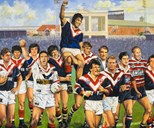The Best We've Ever Seen: Ian Schubert

One of the most iconic Rugby League players of the 1970s, Ian Schubert transitioned from a fleet-footed wonder kid to a hard-running veteran, and etched his name as a Roosters Legend both on and off the field.
| Name: | Ian Schubert |
| Nickname: | Schuey |
| DOB: | 22/08/1956 |
| Club Debut: | Round 1, 1975 vs Balmain Tigers |
| Roosters Player No. | 650 |
| First Grade Games for Club: | 149 |
| First Grade Points for Club: | 147 from 47 tries and 3 goals |
| Premierships: | 1 (1975) |
| Representative Career: | 1975 World Series 1978 Kangaroo Tour 1982 Kangaroo Tour |
| Individual Accolades: | Clive Churchill Medal (1975) Sydney Roosters Centurions (2007) |
Hailing from Wauchope on New South Wales' mid-north coast, Schubert earned his first scalp as a member of the unbeaten Australian Schoolboy Tour of England, and in a matter of years was scouted by super coach Jack Gibson to join the Red, White and Blue.
Exploding onto the scene as an eighteen-year-old, Schubert made his first-grade debut in Round 1, 1975, making an immediate impression with his scintillating speed and dynamic running in the centres, holding a position in the backline through the year.
With fullback Russell Fairfax injured in the round 19 victory against South Sydney, the young star was called on to fill his position - and did so seamlessly - scoring a double against Parramatta the following week and retaining his spot as custodian for the rest of the season.
Capping off one of the greatest rookie seasons in history, Schubert scored a try and had a hand in numerous others in the famous 38-nil Grand Final victory over St George, claiming honours as Man of the Match before making his debut for Australia in that season’s World Series.
Retro Round | Dragons v Roosters Grand Final 1975
Following Fairfax’s return to the side in 1976, Schubert reverted to the wing where he scored a further nine tries – including one in the inaugural World Club Challenge victory over St Helens at the Sydney Cricket Ground as he continued his rise in Red, White and Blue.
A consistent member of the side whether at fullback or on the wing, the fan favourite featured in the 1978 AMCO Cup-winning side, played his 100th first-grade match in 1979, and eventually made brief stints in the second row - a sign of things to come.
Despite playing a majority of matches in 1980 and helping guide the side to the Minor Premiership under new coach Bob Fulton, Schubert did not take part in the Club's Grand Final appearance – and announced his departure from the Club soon after.
Following a season at Western Suburbs, Schubert returned to Bondi in 1982 now with a much larger frame, forcing a transition to the forward pack - with his strong form rewarded with twelve games on that year’s Kangaroo Tour and cementing himself as one of the game's best all-rounders.
Despite his successful move to the middle of the field, he soon found himself back at his old position of fullback through the penultimate rounds of that season, with his 149th and final match for the Roosters in the side's preliminary final.
Continuing his career at Manly, Western Suburbs and in the north of England, Schubert still held a burning desire to return to the Eastern Suburbs, and following his glittering career, he found himself in a position at the Club as Chief Executive Officer.
Roosters Radio Episode 99 - Ian Schubert
His post-football career was highlighted with nearly two decades as the NRL’s salary cap auditor, before returning to the Club once again as salary cap compliance officer - cementing his spot as one of the greatest administrators in the code.
In 2007 he was named in the Sydney Roosters Centurions on the wing alongside fellow teammates Bill Mullins, Mark Harris, John Brass, Kevin Hastings, Arthur Beetson, Ron Coote and Barry Reilly.
Beloved as a teenage sensation who scored tries for fun and respected as an administrator at the Club - Ian Schubert is renowned as one of the great Roosters.

Sydney Roosters respect and honour the Traditional Custodians of the land and pay our respects to their Elders past, present and future. We acknowledge the stories, traditions and living cultures of Aboriginal and Torres Strait Islander peoples on the lands we meet, gather and play on.






